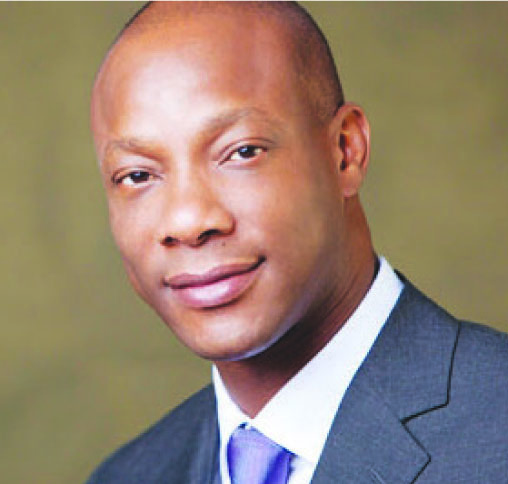Guaranty Trust Bank Managing Director and Chief Executive Officer, Segun Agbaje, unveiled to financial journalists the facts behind the numbers of the banks’ 2015 audited financial result released on the Nigerian Stock Exchange (NSE).
He also addressed a wide range of issues, particularly on meeting foreign exchange (forex) demands, anxiety about domiciliary accounts, and what GTBank is doing to grow small and medium enterprises (SMEs), the engine of any economy.
Assistant Business Editor, KELECHI MGBOJI, reports excerpts from the press conference, which was held in Lagos.
Why 2015 was extremely difficult
In January, global oil prices declined to $46.59 per barrel, a year on year decrease of 55.5 per cent. But inflation rose to 8.23 per cent at the end of the month.
Foreign exchange trading position limit for banks was reviewed to 0.1 per cent and back to 0.5 per cent.
By February, the Central Bank of Nigeria (CBN) introduced incremental averaging for the computation of Credit Reserve Requirement (CRR) for banks on a fortnightly basis.
Also, the CBN closed the Retail Dutch Auction Sales (RDAS) window. In its place, the regulator commenced special auctions at the interbank market at N297 per dollar, resulting in a tacit devaluation of the naira.
And it introduced trading curbs around the naira.
March marked the beginning of the implementation of the Treasury Single Account (TSA) which saw the transfer of funds from Ministries, Departments, and Agencies (MDAs) of the government into a consolidated revenue fund domiciled with the CBN.
Then in April, the CBN reviewed the limit on the usage of the naira denominated cards for international transactions downwards from $150,000 to $50,000 per person per annum.
In order to cushion the grave impact of the TSA implementation, in May the CBN harmonised the CRR to 31 per cent for both private and public funds.
Subsequently in June, it revalued the naira by 5 kobo from N197 per dollar to N196.90 per dollar and then N196.95 per dollar. Also in June, the CBN banned 41 items from all Nigerian forex markets.
By July, it instituted a limit of $300 international daily ATM (automated teller machine) withdrawals, and also rolled out the cashless policy in the remaining 30 states of the federation after successful testing of the policy in the pilot cities of Lagos, Abuja and others.
In August, acceptance of foreign exchange cash deposits by all deposit money banks was suspended. Also prohibited was foreign currency lending to customers without foreign currency receivables.
Going into September, the CBN reduced the CRR from 31 per cent to 25 per cent. And the deadline of the TSA remittance in the month witnessed partial compliance by banks.
In October, the CBN permitted the sale of forex for LCs approved before exclusion circular of 41 items even as it expanded the list of exclusion items labelled not valid for forex.
It also released a circular making BVN (Bank Verification Number) mandatory for all forex transactions.
In November, the Monetary Policy Rate (MPR) was reduced to 11 per cent from 13 per cent just as there was a conditional decrease of the CRR to 20 per cent from 25 per cent.
As inflation continued to trend upwards to 9.4 per cent from 9.3 per cent in October, the CBN increased General Loans Provisions from 1 per cent to 2 per cent.
December came with anxiety over 25 basis points hike in interest rates by the United States Federal Reserves; the federal government revealed the 2016-2017 medium term expenditure framework (MTEF) and Fiscal Policy Strategy.
By end of the year, naira exchanged for N282 to the dollar in the parallel market.
How GTBank navigated 2015
The volatility that characterised the year notwithstanding, GTBank posted impressive results when compared with peers.
Profit after tax stood at N99.4 billion up from N94.4 billion in 2014, a 5.3 per cent growth. Profit before tax was N120.7 billion for 2015, up from N116.4 billion.
Gross earnings rose from N278.5 billion in 2014 to N301.9 billion in 2015.
As the bank grew loans book by 7.5 per cent, Interest Income rose 14.3 per cent to N229.2 billion in 2015, against N200.6 billion in 2014 compared with negative Non-Interest Income growth of 6.8 per cent or N72.6billion in 2015 as against N77.9billion in 2014.
Total loans and advances to customers stood at N1.371 trillion, up from N1.275. Deposits from customers moderated 0.5 per cent to N1.610 trillion as against N1.618 trillion in 2014.
Despite the devastating impact of CRR and TSA on deposits, total assets grew 7.2 per cent to N2.524 trillion, up from N2.355 trillion.
Little impact of TSA on GTBank
If you check the effect of CRR on the profitability of GTBank for instance, if you take 20 per cent of our deposit base for instance, which is somewhere around N1.3 trillion, this will add up to about N300 billion.
If you take away 5 per cent of that amount, you will see what it comes to. Commission on Transaction (COT) was also down.
We started experiencing liquidity challenges in foreign exchange in the first quarter (Q1) of last year. So a lot of income line were being assailed.
If you were to put back the impact of all these things and remove the impact of CRR, and some of the regulatory changes, probably we would have finished the year somewhere around N150 billion.
However, we were not very affected by TSA because we are not a big government-focused bank. Government money represented about 3 per cent of our business.
By the end of September 2015, we had paid the government all the TSA deposits, naira and dollars, without asking for any reprieve.
We have no more government money, so I don’t think TSA affected our business in any crazy way.
Meeting forex demands of customers
2016 is a very challenging year. The country used to earn $115 per barrel from crude oil but it now earns barely $40 per barrel.
The implication is that we all have to change. We have to adapt to an environment where earnings have gone down.
Meeting forex needs of customers? Should we have been importing everything? Should some of these people not have developed local industries which should have developed import substitution?
I cannot meet forex demand of customers outside the earning capacity of the country. We are all limited by what the country earns. So, we will all have to adjust and live within our means which I think is already happening.
For the correspondent banks, I think they were reckless. I think the correspondent banks were extending credit at a time when the country’s earnings were going down.
Together, we have to be in this situation and make sure we work out our problems and live within our means. We will continue as much as we can within the earnings of the country or what the country can afford to meet the demands of our customers.
I think we are a bit unfair sometimes to both the country and the banks when we make it the problem of banks that customers don’t get foreign exchange.
Some of these customers should have invested in import substitution and not rely on importation. They should have been able to source their raw materials locally.
It is not right to continue to blame the country and the banks for the lack of foreign exchange when the earnings capacity of the country have gone down visibly to everybody.
I love my customers and we will continue to work together. But nobody should expect us to do beyond what the earnings capacity of the country is today.
Those are some of the difficulties we all have to navigate and work together. We are all partners in this.
Also the worst thing banks can do is to say it is difficult times, therefore go away. In good times or bad times, you nurture your relationships. We handle them differently.
These are not good times. It is a very difficult time. We must all navigate and work within the resources of what the country can afford.
Anxiety over domiciliary accounts
The domiciliary account is an extremely important product. We must not allow confidence to damage that product. Domiciliary account allows us to do different things.
There was some panic around that product, and there has been in the last one year.
The anxiety started all of a sudden but the statement issued by the CBN after the last Monetary Policy Committee (MPC) meeting was a very strong one and I hope it will help restore people’s confidence and keep some stability around those deposits.
Growing SMEs
If you look at the history of GTBank, we started our life putting our energy on corporate business banking. Corporate business banking became very successful.
And four to five years ago, we started diversifying into retail banking. Retail banking has become very successful for us.
Today, there are many people who believe GTBank is not a strong retail bank. But in terms of retail customers, we have 6.6 million.
If you look at BVN-linked customers in the industry, we are number two. But from the outside, most people will never believe that.
The same about SMEs. SMEs account for about 10.5 per cent of our deposits base of N1.7 trillion. So it means that we are holding SME deposits of about N170 billion. So, we have SME business, and we are now starting to grow the sector.
There are no banks that are doing SME that anybody should be scared of. Everybody in Nigeria is SME. If you look at the quantum of SMEs available and the business banks are doing, nobody has taken a hold of it yet.
So as far as I am concerned, we are still at the early stages.
We have over 12,000 people in the SME market hub we have created, which is a free market model. You will start to see us doing more and more things in the SME space.
We have signed a loan with a French multilateral agency to give loans to SMEs as passionate guarantee. You won’t see it in one year but I promise you, in three years, you will see us a strong SME bank.
Nothing happens overnight. The journey has started. You will start to see and feel the perception that we are not SME bank changing.
But you can’t change perception overnight. You have to work in the world of reality, grow the business for people to see, and you see the perception changing.














